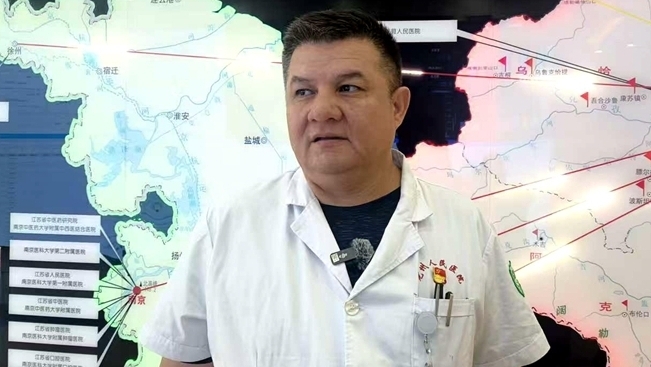A medical assistance program from Jiangsu province is saving lives in Kizilsu Kirgiz autonomous prefecture of northwest China's Xinjiang Uygur autonomous region, providing free heart surgery to patients who previously had no access to advanced cardiac care.
Funded from medical insurance and program allocations, the "Runxin" or "Heart-warming" program, launched in 2016 at Kizilsu Kirgiz People's Hospital, has invested 15 million yuan ($2 million) and performed 1,322 heart and eye surgeries with a 100% success rate.
Originally focused on patients with congenital heart disease, the program has expanded to include eye care while continuing to target low-income families and border patrol personnel.

Kaderjian Musha, deputy director of Kizilsu Kirgiz People's Hospital, introduces the "Runxin" program at the hospital in Kizilsu Kirgiz autonomous prefecture, northwest China's Xinjiang Uygur autonomous region, Aug. 13, 2025. [Photo by Xu Xiaoxuan/China.org.cn]
Kaderjian Musha, deputy director of Kizilsu Kirgiz People's Hospital, said advanced cardiac surgery was virtually impossible when he joined the facility in 1998.
"We had a cardiothoracic surgery department, but the technical difficulty was high, and many doubted our hospital could succeed," Musha said. "Patients couldn't afford the procedures either."
With hands-on support from Jiangsu's medical teams, the department has established standardized systems for equipment, staffing and operating conditions.
Over the years, Musha has witnessed the program change countless lives — from young children to elderly herders. One of Musha's most memorable cases involved a 7-year-old Kirgiz boy who struggled to breathe after running just a few steps.
"His grandfather thought it was a minor problem," Musha said. "I visited their home three times and made more than 50 phone calls before they agreed to surgery. The boy recovered completely."
In August, 65-year-old herder Aishanjian underwent heart surgery after living with cardiac disease for seven years. He had delayed treatment because he couldn't afford the cost until the Runxin program covered it entirely.
"I never dreamed I could recover so well. I'm so happy," Aishanjian said.
Since its launch, the Runxin program has even expanded beyond China's borders, treating patients from Kyrgyzstan and sending Chinese specialists there to perform operations.
The Runxin program represents just one element of Jiangsu's comprehensive medical assistance efforts, whose broader impact is reflected in the complete transformation of Kizilsu Kirgiz People's Hospital. Founded in 1954, the hospital once struggled with technology shortages, inadequate equipment and limited space.
Today it serves as the prefecture's only Level III Grade A general hospital, integrating medical services, teaching, research, disease prevention, public health, emergency care and rehabilitation.
Ji Jing, who heads Jiangsu's medical assistance team and serves as hospital president, said the eastern province has invested 290 million yuan since 2016, dispatching 150 doctors in four groups. Nine Jiangsu hospitals now support three additional facilities in the prefecture.

A local doctor assists a physician in Jiangsu province in performing a remote thyroid examination on a patient at the hospital in Kizilsu Kirgiz autonomous prefecture, northwest China's Xinjiang Uygur autonomous region, Aug. 13, 2025. [Photo by Xu Xiaoxuan/China.org.cn]
To address specialist shortages and geographic challenges, the hospital began building an internet-based platform in 2022 for remote diagnosis and treatment. Training programs are developing general practitioners at the township and village levels.
The medical team has organized free clinics treating nearly 5,000 patients in remote villages.
"Some roads are difficult to travel, but we still go, examine residents, provide free medicine and create health records," Ji said. "We maintain contact information and work with local liaisons for follow-up care."
For Jiangsu gastroenterologist Wang Hui, who arrived eight months ago, building local medical capacity is just as important as treating patients.
"Each of us mentors two local doctors to improve their clinical skills," Wang said. "Language barriers mean local medical students often help translate during consultations."
Wang emphasized patience as crucial when working with patients unfamiliar with hospital procedures.
"Some local patients have little awareness of hospital care and may abandon treatment prematurely," she said. "It's important to ask precise questions, show patience and build their confidence in our care."


 Share:
Share: 




 京公網安備 11010802027341號
京公網安備 11010802027341號